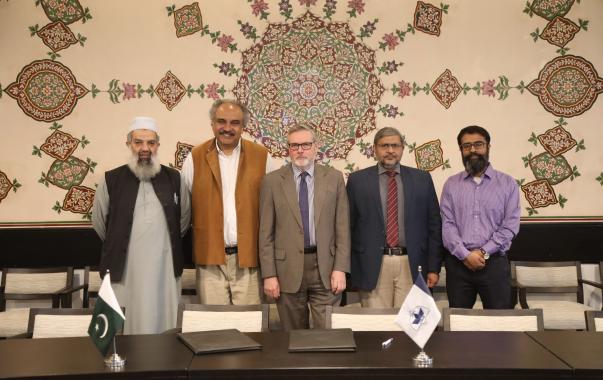
LUMS has signed a Memorandum of Understanding (MoU) with the University of Leeds. The MoU signing ceremony took place on April 18, 2019. The agreement was signed on behalf of the University of Leeds by Dr. Terry Cousens, Senior Lecturer, Department of Civil Engineering and Dr. Shahid Masud, Dean Syed Babar Ali School of Science and Engineering (SBASSE). Also present on the occasion were, Dr. Kamran Asdar Ali, Dean Mushtaq Ahmad Gurmani School of Humanities and Social Sciences (MGSHSS) and Dr. Tariq Jadoon and Dr. Momin Uppal from the Department of Electrical Engineering.
The broad scope of the academic and research collaboration agreement between the two Universities will allow for the development of collaborative research projects; organisation of joint academic activities such as courses, seminars, conferences, symposia and lectures; exchange of research and teaching personnel; placement and exchange of students and exchange of publications and other materials of common interest.
“The MOU will open the doors for the faculty and students from both universities to explore new research directions and take up exchange visits for enriching their educational experience,” said Dr. Masud.
The MoU was catalysed by an ongoing research project between the Department of Electrical Engineering at LUMS and the University of Leeds. The project, led by LUMS faculty, Dr. Momin Uppal and Dr. Abubakr Muhammad along with Dr. Syed Ali Raza Zaidi from the University of Leeds, is supported by an award from the United Kingdom's Grand Challenge Research Fund (GCRF).
The key aim of the project is to develop low cost, reliable and ultra-low power Internet of Things (IoT) sensors for agricultural monitoring. Research activities within the scope of the project are geared towards pursuing a clean-slate design of agricultural sensors, which is underpinned by recent advancement in communication, information theory, geo-informatics and embedded electronics.
"Coping with internal food security challenges as well as achieving international price competitiveness requires that Pakistan's agricultural sector embraces the data-driven agricultural revolution. This revolution entails monitoring and analysing the farm's health using the IoT paradigm. Although there do exist IoT solutions for agricultural applications, they are mostly besieged by high operational and maintenance costs. Through this project, we aim to develop low-cost and low-power sensors that could be specially useful for poor farmers in developing countries such as Pakistan," shared Dr. Uppal.








